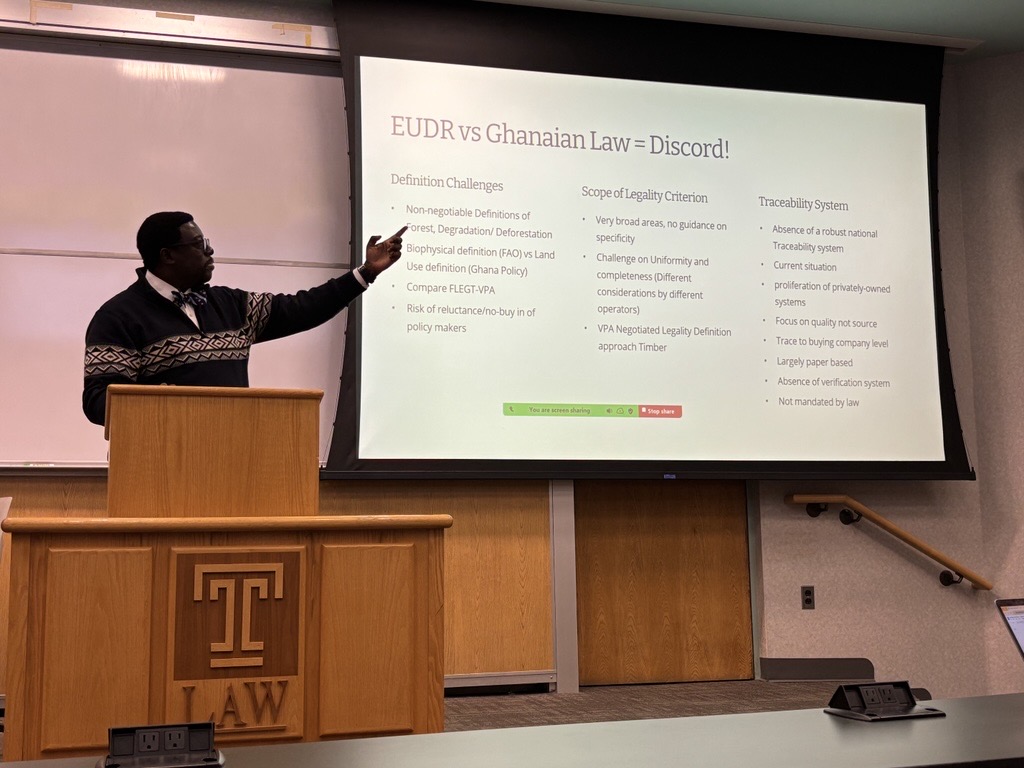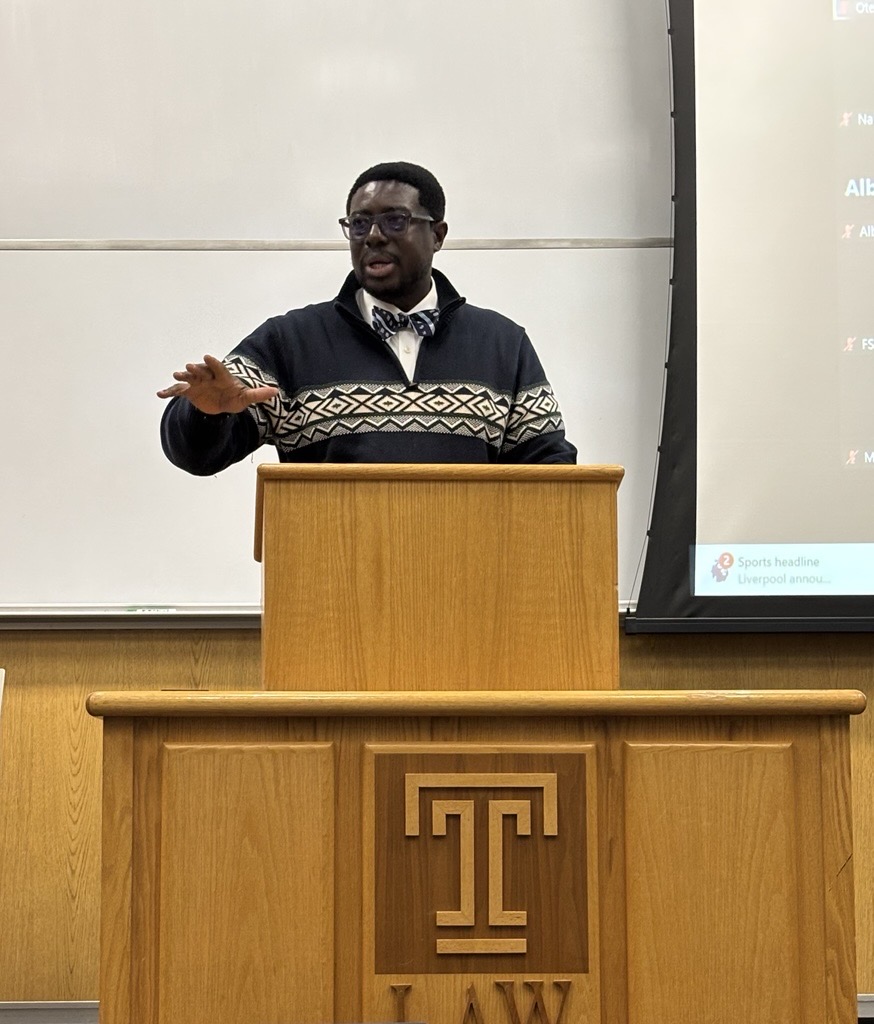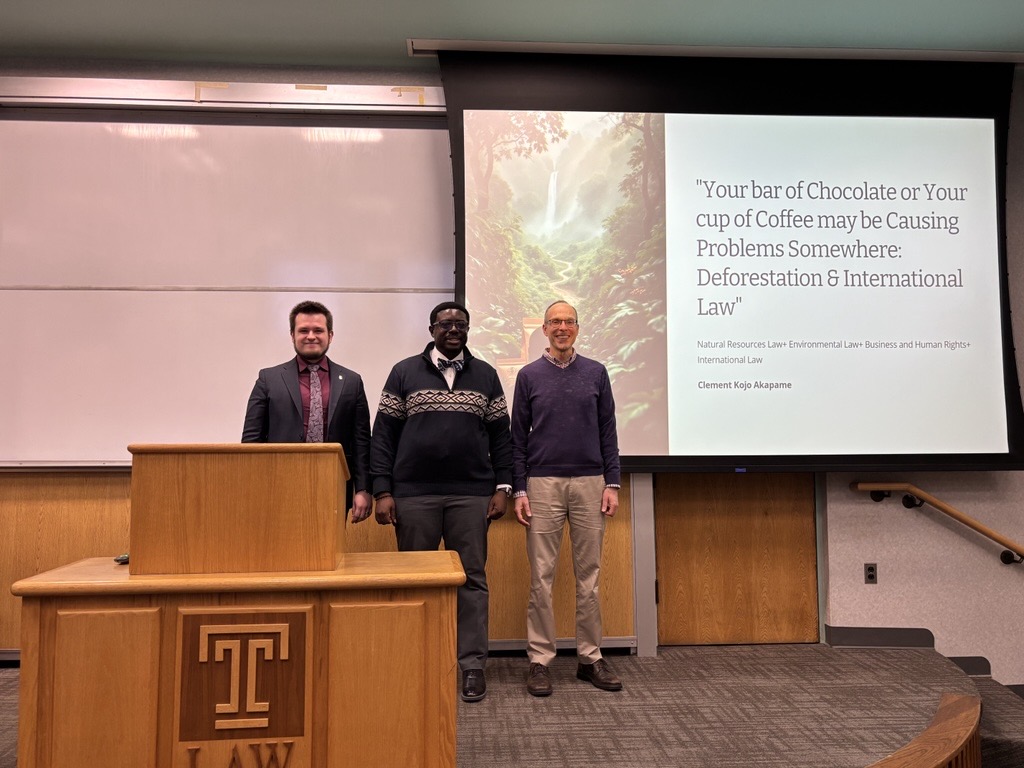On April 9, 2025, Professor Clement Kojo Akapame, a visiting scholar from the Ghana Institute of Management and Public Administration (GIMPA), presented a lecture titled “Your Bar of Chocolate or Your Cup of Coffee May Be Causing Problems Somewhere: Deforestation & International Law” to Temple Law students. Many students from GIMPA, as well as GIMPA’s Dean Kwaku Agyeman-Budu, also attended the lecture virtually by Zoom. The lecture, organized by Temple Law School’s International Legal Society, summarized the research that Professor Akapame has been conducting for nearly the past year, since his arrival on Temple’s campus in August 2024.
Professor Akapame is a legal academic and thought leader who specializes in sustainability standards for the commercial trade of forest risk commodities, as well as forestry law and policy on environmental conservation. He is also a Partner at Taylore Crabbe Barristers and Solicitors, where he leads the firm’s Corporate Commercial and Consultancy practice team.
During his lecture, Akapame identified issues of deforestation due to the exploitation of cocoa bean farmers by large companies in the chocolate industry, and proposed solutions based on international law and norm transplantation. Professor Akapame argues that as the European Union, United States, and other countries maintain a high demand on cocoa beans to produce consumable goods, such as coffee and chocolate, less economically developed countries, including Ghana, ultimately bear the burden of supplying the industries. The demand is so great that farmers turn to child labor and plant cocoa trees in protected forests, causing significant environmental damage. Furthermore, many farmers never even get a chance to taste the products that owe their existence to the people on the ground working long hours harvesting beans. Professor Akapame criticized the reliance on voluntary corporate standards and certification systems and argues that these approaches have failed to create real change. Instead of voluntary standards and disorganized certifications by a patchwork of local companies, states should develop national plans to address environmental concerns related to deforestation driven by farmer poverty with rules that clearly define key performance indicators to achieve sustainability goals.
To conclude his presentation, Professor Akapame evaluated possible opportunities for reform and pathways to a more sustainable future. He emphasized his support for new legislation, such as Ghana adopting a model like the EU Deforestation Regulation, to require environmental safeguards in the cocoa trade. In his view, such legal frameworks are essential to achieving sustainability and reducing deforestation.
Following the lecture, students asked engaging questions regarding clarification of sustainability certifications, potential risks to farmers, and solutions for sustainable cocoa production, which allowed Professor Akapame to expand on his research and offer further insight on the topic.
The presentation highlights a strong partnership with the Ghana Institute of Management and Public Administration (GIMPA), where Professor Akapame teaches commercial law and select topics on natural resources. Temple has a very rich and special history in Ghana. The former President of Ghana, John Mills, used to teach tax law at Temple Law, and Professor Samuel Gyandoh taught constitutional law, having published what is widely regarded as the standard constitutional law book in Ghana. Dr. Kwaku Agyeman-Budu, the Dean of GIMPA, also joined the presentation virtually and emphasized the need to produce the next generation of legal scholars and leaders in Africa and the US. A testament to the success of the Visiting Scholar program, Professor Akapame’s presentation promises to be the first of many, and the Temple community hopes to welcome more visiting scholars and LL.M. students from GIMPA in the future.




